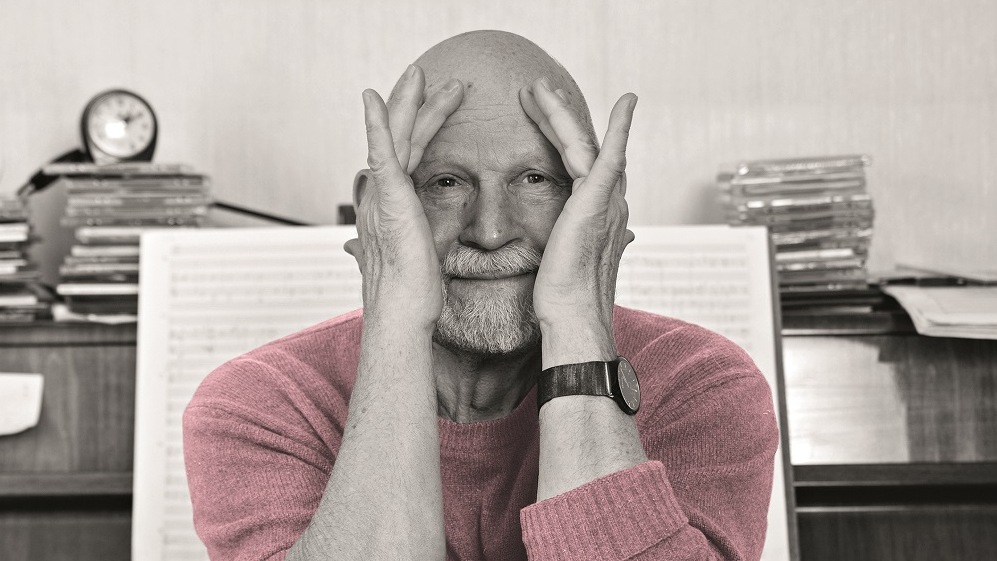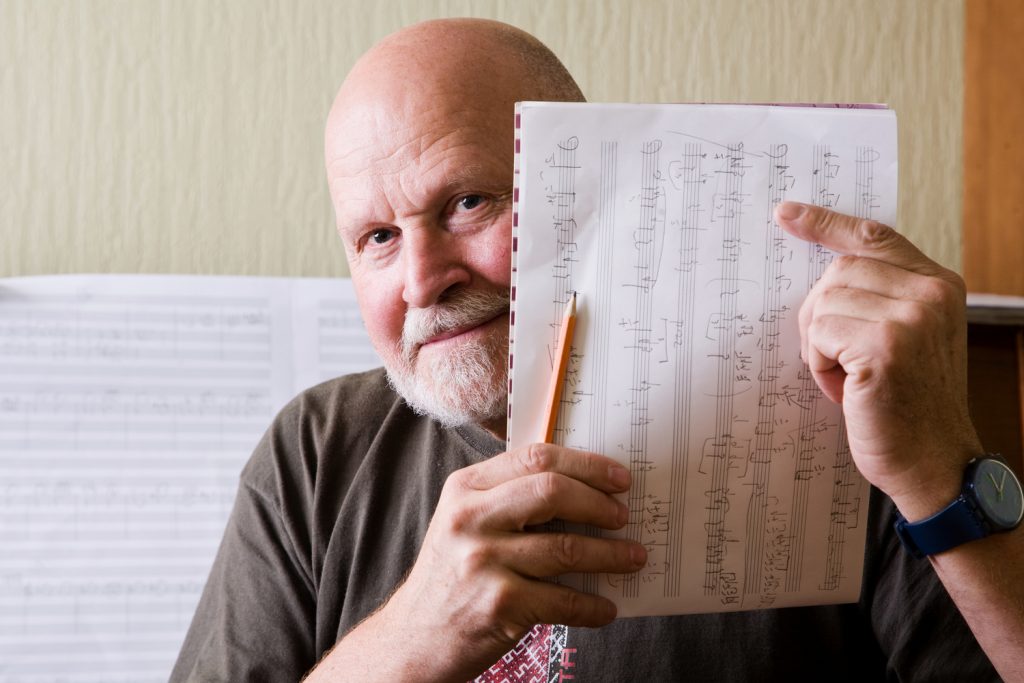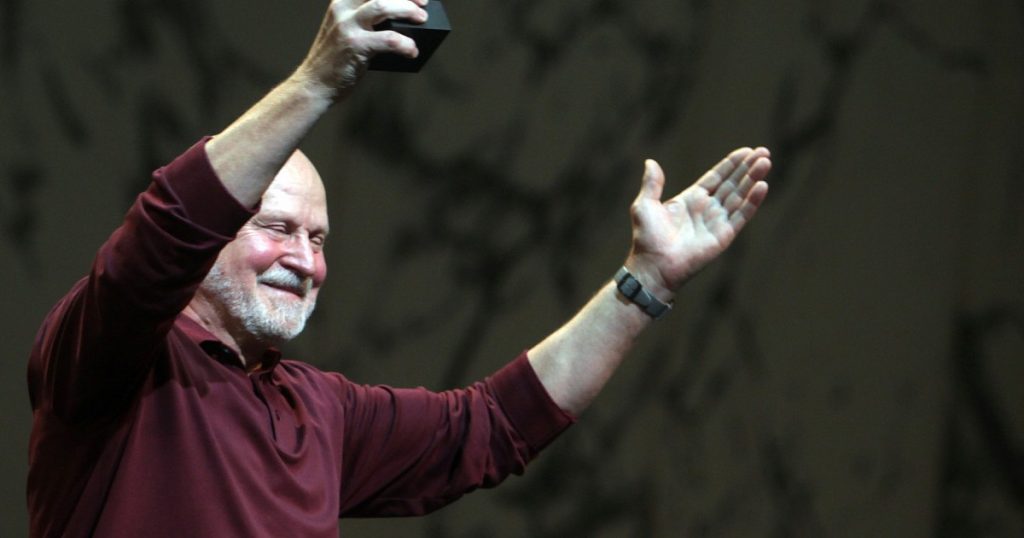



Biography
Pēteris Vasks (born 16 April 1946) is a Latvian composer
Vasks was born in Aizpute, Latvia, into the family of a Baptist pastor. He trained as a violinist at the Jāzeps Vītols Latvian Academy of Music, as a double-bass player with Vitautas Sereikaan at the Lithuanian Academy of Music and Theatre, and played in several Latvian orchestras before entering the State Conservatory in Vilnius in the neighboring Lithuania to study composition with Valentin Utkin, as he was prevented from doing this in Latvia due to Soviet repressive policy toward Baptists. He started to become known outside Latvia in the 1990s, when Gidon Kremer started championing his works and now is one of the most influential and praised European contemporary composers.
Vasks’ early style owed much to the aleatoric experiments of Witold Lutosławski, Krzysztof Penderecki and George Crumb. Later works included elements of Latvian folk music, such as his gentle and pastoral cor anglais concerto (1989). His works are generally extremely clear and communicative, with a solid and muscular sense of harmony. Lyrical passages may be followed by agitated dissonances, or interrupted by sombre sections with a march-like feel. He made extensive use of minimalist techniques as well, but never became attached to any particular method.
Vasks feels strongly about environmental issues, and a sense of nature both pristine and destroyed can be found in many of his works, such as the String Quartet No. 2 (1984). Other important works include Cantabile (1979) and Musica dolorosa (1984) and “Bass Trip” (2003) for solo double bass. He has written five string quartets, the fourth (1999[) and fifth (2004 ) of which were written for the Kronos Quartet.
Vasks was the recipient of the Vienna Herder Prize of the Alfred Toepfer Foundation in 1996, as well as the Baltic Assembly Prize for Literature, the Arts and Science, and the Latvian Grand Music Award in 1997, the latter for his violin concerto Tālā Gaisma (“Distant Light”) (1996-7). He received the Cannes Classical Awards in 2004. His important works also include “Viatore”, Symphony No. 2 and “Music for a deceased Friend”.
Since 1994 he has been an honorary member of the Latvian Academy of Sciences and in 2001 he became a member of the Royal Swedish Academy of Music. In 1996 he was the main composer at the Stockholm New Music Festival and in 2006 composer-in-residence at the Presteigne Festival of Music and the Arts and the Vale of Glamorgan Festival in Wales.
In 2005 he received the Estonian honour the Order of the White Star, 3rd Class.
Vasks – Oeuvre
Pêteris Vasks werd in 1946 geboren in Letland. Hij was de zoon van een predikant. Aanvankelijk speelde hij contrabas in verschillende professionele orkesten en ensembles, waaronder de Litouwse Nationale Filharmonie en het orkest van de Letse Radio en Televisie. Hij heeft echter altijd beweerd dat de cello zijn meest geliefde instrument is.
In de jaren 70 volgde hij de studie compositie aan het conservatorium van Riga. Een bekend collega componist uit Letland is Arvo Pärt.
Na een experimentele start werden zijn werken geleidelijk aan tonaal. Behalve oude Letse muziek gaan zijn werken over de toekomst van mens en natuur. Vaak schept hij hiermee duistere en klagende muziek. Vanwege zijn politiek getinte werken (tegen de communistische overheersing) was voor de componist raadzaam deze werken pas na de val het communisme te laten publiceren en uit laten voeren..
Composities zijn o.a.: Religieuze muziek waaronder Pater Noster en Donna nobis pacem, het Vioolconcert Distant light, Altvioolconcert, Celloconcerten, Symfonieën.
VASK OEUVRE NUMMER 804
https://klassiekemuziek.tv/vasks-oeuvre/?utm_source=rss&utm_medium=rss&utm_campaign=vasks-oeuvre
Composer: Pēteris Vasks (16 April 1946 — present) – Choir: Latvian Radio Choir – Conductor: Sigvards Kļava – Year of recording: 2007 Pater noster, for choir & string orchestra (ad lib.), written in 1991. One movement, marked ‘Cantabilissimo’. Q&A with Ināra Jakubone and Pēteris Vasks: – Ināra Jakubone: When did you compose the Pater noster and what meaning does its title hold for people today? – Pēteris Vasks: It was in the eighties when my father, who was a minister, often asked – son, when will you compose „The Lord’s Prayer”? One that the congregation could sing in faith – simple but convincing. I answered that I hadn’t matured enough to write it. And so the idea kept being postponed; my father passed away, and only after many years did I finally write Pater noster. That’s why for me the piece has a kind of duality – it is for my own father, and for our common Father. Pater noster is a prayer, and I have always thought that prayer is a spiritual concentration, an act of faith, asking for some guidance in this world where we all are lost. Sacred music and sacred texts were the first musical impressions of my childhood. Although there was no organ, only a harmonium, in the church of my hometown Aizpute, we had a fairly good church choir and, listening to their singing, the desire to compose came to me quite naturally. It was a very personal process. I did write sacred songs, yet didn’t give them to anyone to sing. Later, when my father was a minister in Riga, I wrote a few sacred songs for his church choir. When I began to study composition I quickly understood a fundamental thing. Namely, that in order to be spiritually free you must write instrumental music or at least something with folkloric texts, because in that political regime sacred music was simply forbidden. It was clear to everyone that if you write sacred music, it will end up at the bottom of your desk drawer and never see the light of day. But at that time for me it was more important to hear a live performance, to gain musical experience. For this reason I wrote almost no vocal music and, of course, even less sacred music. In my opinion writing sacred music is the highest responsibility. – Ināra Jakubone: Why so? – Pēteris Vasks: If true, deeply felt faith is not inherent in sacred music, if it lacks genuine conviction, then it is especially amoral. When my father encouraged me to do it, I wasn’t capable of experiencing it, for to me many other things seemed far more interesting… And then came the nineties, the regime fell, and an interesting metamorphosis occurred wherein many „court” composers of the previous regime stopped praising the (communist) party and suddenly became believers. Again, in the context where new rules came into play and new conditions encouraged writing of sacred works to the point of being almost a trend, I felt no desire to write something like that… Pater noster was my first sacred piece written in my mature years. In two versions – Latvian and Latin.
Alina Pogostkina (Violin)/Sinfonietta Riga/Juha Kangas (Conductor)……… Paintings by ”Faiza Maghni”…………….
Klātbūtne (‘Presence’), concerto for cello and string orchestra I. Cadenza – Andante cantabile II. Allegro moderato III. Adagio Soloist: Sol Gabetta Conductor: Candida Thompson Orchestra: Amsterdam Sinfonietta Composer: Pēteris Vasks (1946 – …) Live
Pēteris Vasks : Plainscapes (Līdzenuma ainavas) for mixed choir (vocalise), violin and cello ……….Latvian Radio Choir, Sigvards Kļava Paintings by Hu Jundi (Hu Jun Di 胡峻涤China b 1962)
Peteris Vasks is a passionate composer and Daniel Rowland shares his passion for music. How much they relate to each other has become very clear in Daniel Rowland’s new album ‘Distant Light, an all-Vasks CD. It is a sublime album which offers an overview of four of Peteris’s most iconic works, from the large scale, dramatic Violin Concerto ‘Distant light’, and the magically dreamy meditation ‘Lonely Angel’, to his evocation of Latvian landscape and birdsong ‘Plainscapes’ and the extatic ‘Dona Nobis Pacem’. In this mini documentary Daniel Rowland and Peteris Vasks tell you more…. This video and production has been recorded and filmed in 2019 before the Covid 19 pandemic! For the album go to: https://www.challengerecords.com/prod…
Pēteris Vasks: Cello Concerto (1993/94)/Steven Isserlis, cello · Gints Glinka, conductor · Latvian National Symphony Orchestra/The Great Guild I: Cantus I II: Toccata I III: Monologhi IV: Toccata II V: Cantus
